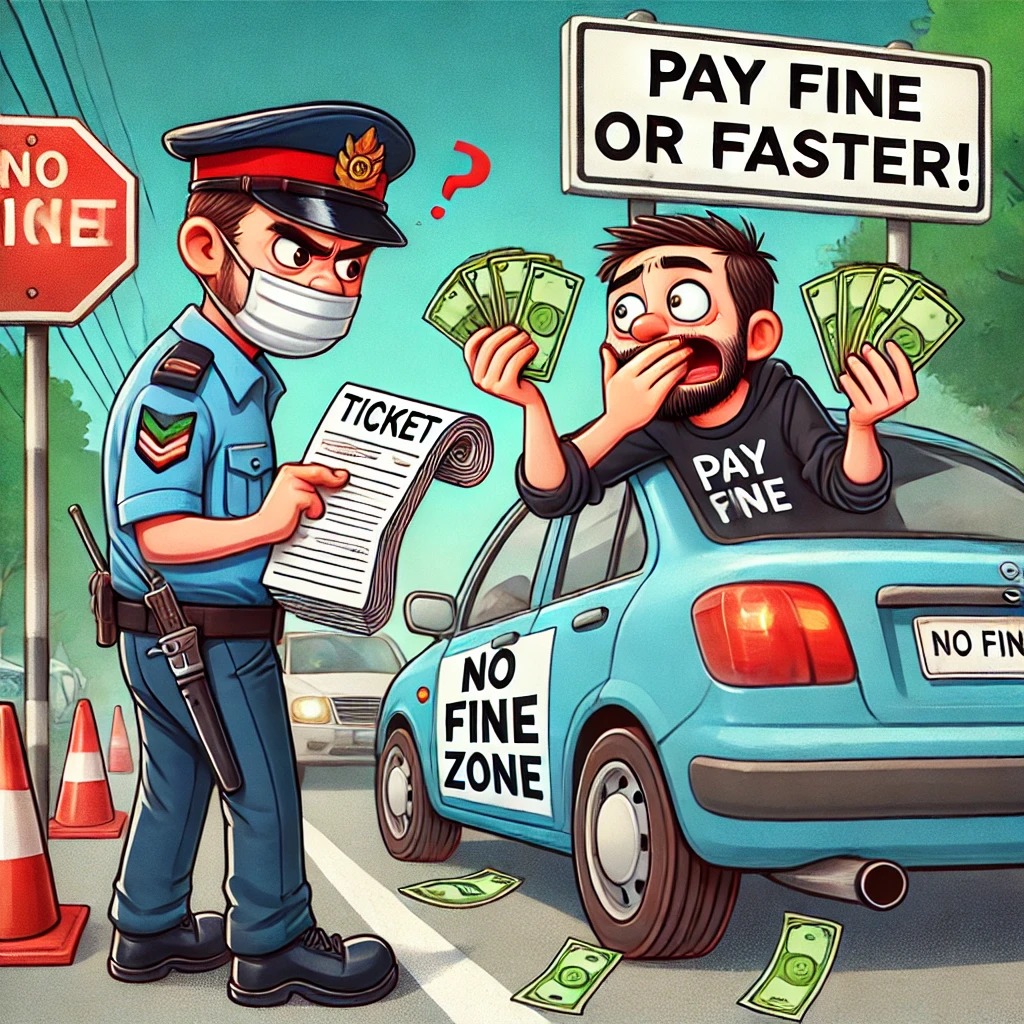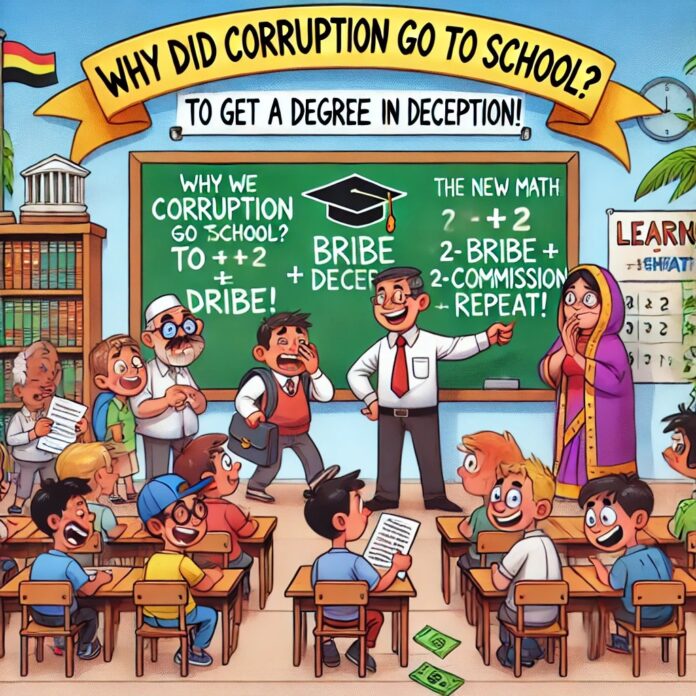- “Why did corruption go to school? To get a degree in deception!”
- “What’s the new math? 2 + 2 = bribe + commission!”
- “Why do schools teach ABC? Because corruption starts with A (bribe) B (lobby) C (cover-up)!”
- “Teacher: ‘What’s the opposite of honesty?’ Student: ‘Getting good grades!'”
- “School motto: ‘Learn, Cheat, Succeed, Repeat!
In schools, religious organizations, and virtually everywhere else, we teach our children about honesty, integrity, and moral responsibility. Adherence to the authority of Teachers, Parents and Elders. We teach them not to lie, preach the Ten Commandments, introduce them to dharma, and fill their heads with what society deems ideal, based on decent value systems. But the children as they grow in life, they start facing realities of the actual society including that of teachers, parents and their peers. Even when they take their first steps into the real world with some pocket money, the inequalities hit them—rich versus poor, the size of pocket money, and the influence of their parents’ power and positions.

What they learn at school and at home about honesty often clashes with reality. Sometimes what they see in schools and homes itself creates a clash in their minds. They watch their parents bend the rules to secure educational seats by paying “donations” or using “private seats,” and some even manipulate exam results. These children, raised on lectures of principles of honesty and moral righteousness, grow up in societies deeply rooted in corruption—globally, not just in India. Even so-called superpowers like the USA and Europe, alongside countries like China, face deep-rooted corruption.
This was brought to light during a conversation with an elder in my family who runs a school. He shared his discussion with a Neuro-Linguistic Programming (NLP) trainer and how he trains potential\wanting politicians. The exchange with him and the NLP trainer revealed a moral dilemma that educators (and even parents and elders of the family) face. While we teach children to be honest and upright, they question whether they are truly preparing them for the world. The answer is, quite frankly, no.

As an educator, my uncle has come to the uncomfortable realization that while teaching children to be good, he must also teach them how to navigate a corrupt society. This isn’t about endorsing dishonesty but equipping them with the tools to survive in a world where moral integrity is quite less. Otherwise, the disconnect between what they are taught and what they experience leads to confusion, conflict, and erratic behavior in young minds. They become disillusioned, smile outwardly at teachers and parents while harboring different thoughts in their hearts and grow to different induvial that we know of.

This conversation reminded me of an article I wrote on ‘Sva Dharma’. It’s our duty to follow what we believe is right—our dharma.
Sreyan sva-dharmo vigunah para-dharmat sv-anusthitat,
Sva-dharme nidhanam sreyah para-dharmo bhayavahah.
(Bhagavad Gita 3.35)
“It is better to perform one’s own duties, even if imperfectly, than to perform another’s duties perfectly. Destruction in the course of performing one’s own duty is better than engaging in another’s duties, for following another’s path is dangerous.”
We need to let children choose their path and let them choose their Dharma and stick to it.
In my uncle’s case, his dharma as an educator is to first ensure that his students survive in the real world, and only then guide them to become better citizens. He can’t focus solely on finding the one child in ten thousand who will grow up to run an NGO and become the next Saint Mother Teresa, Ramanujacharya , Bose, Gandhi, Honest Abe or upright Martin Luther King or Aurobindo (again conflicts raise when they read even about the individuals I quoted). For most, that’s not reality. Therefore, his argument—that teaching children to navigate corruption is essential—carries weight. In fact, he suggested institutionalizing this as a subject, like any other, to teach children about the real world and there is no two words saying about this and its required even in my opinion.
In a moment of frustration, my uncle went as far as to say, “Maybe we should just legalize corruption.” While extreme, I understood his point. He wasn’t advocating for legalizing corruption but reflecting on how deeply it has become ingrained in society. His statement highlights a broader truth: corruption is so entrenched that it sometimes operates within its own parallel ‘moral’ framework—what is seen as ‘good’ corruption versus ‘bad’ corruption.
His frustration stems from how the entire education system is structured around the world. We preach honesty in schools, but beyond those walls, the system sinks deep in dishonesty. From biased textbooks especially of Social Sciences, History and to paid seats in higher education, the contradictions are glaring.
And this isn’t just India’s problem. In the USA, ‘legalized corruption’ exists in the form of lobbying in politics and money-driven decisions in healthcare and education and judgements thru highly paid Lawyers and for that matter labeling of Supreme Court Judges as Liberals and Conservatives and easily predicting outcome of judgements on party adn personal affiliations. Europe, while outwardly ethical, often masks wealth gained through colonization behind a democratic and human rights show. The best example is India’s absence from the UN Security Council, a glaring anomaly at the world’s highest decision-making body for world most populous country. Even China, despite being touted as an egalitarian ideal society, has its corruption concealed behind closed doors and the problems different ethnic groups face and which itself is another problem now.
So, what are we really teaching our children? Are we painting an honest picture of the world they’ll face, or are we setting them up for confusion by promoting ideals that society itself fails to meet?
My uncle’s approach, though controversial on the surface, is highly realistic and pragmatic. His job is to prepare children not just for exams but for life. This includes teaching them how to handle corruption—because pretending it doesn’t exist won’t make it disappear. Ignoring it may leave children unprepared for the compromises they’ll inevitably face.
Ultimately, the goal is to produce citizens who can navigate this flawed world “and to make it better” while maintaining some degree of integrity. This reflects Lord Krishna’s teachings in the Bhagavad Gita. We must also teach Karma Siddhanta, so children understand that actions have consequences—what they sow is what they reap. But expecting children to uphold ideals that adults themselves cannot follow is unfair. Maybe the answer lies in teaching them both: how to be good and how to survive in a corrupt world.
Let’s address the gap between what we teach and the world as it truly is, our education system will continue to fail. We often emphasize employability—preparing students for jobs and careers—but what about livability? We owe it to our children to teach them not only moral values but also how to confront the challenges and ethical dilemmas they will inevitably anyway face. It’s time we start having these honest conversations, uncomfortable as they may be and urgent changes in education systems.
References :
- Jansankalp Foundation – Dharma is Simple: One’s Prescribed Duties by Balaji P. Krishnammagaru.
- OECD (Organisation for Economic Co-operation and Development) – Fighting Corruption in Education: OECD Anti-Corruption Report
This report highlights the challenges of corruption in education systems and offers strategies to improve transparency and accountability.
- Business Standard – Educational Corruption in India: How Donation Culture is Affecting Our Education (2021).
https://www.business-standard.com/article/current-affairs/educational-corruption-in-india-how-donation-culture-is-affecting-our-education-121050500392_1.html
- The Atlantic – How Money Corrupts American Politics (2020).
https://www.theatlantic.com/magazine/archive/2020/01/how-money-corrupts-american-politics/602947/
- The Guardian – Corruption in China: How Party Officials Enrich Themselves (2020).
https://www.theguardian.com/world/2020/jul/20/corruption-in-china-how-party-officials-enrich-themselves
- Hindustan Times – Indian Education System Needs an Overhaul (2022).
https://www.hindustantimes.com/education/indian-education-system-needs-an-overhaul/story-5u6jui3Xl4kxpGzAKmxIzL.html


